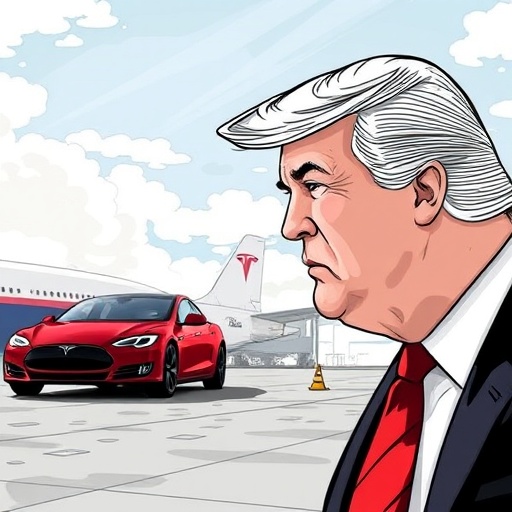
Elon Musk’s SpaceX and Tesla Lobby Trump Trade Rep on Tariffs
In the evolving landscape of global trade, Tesla and SpaceX, two prominent companies led by billionaire Elon Musk, have taken significant steps to engage with the Trump administration regarding tariffs. This article delves into the implications of their lobbying efforts, the challenges posed by tariffs, and the broader conversation surrounding trade policy that affects their operations. As they navigate the complexities of trade, both companies are seeking to ensure their growth and competitiveness in the international market.
What is the Role of Tesla Lobbying Trump Trade Representatives?
How does Tesla’s lobbying influence trade policies?
Tesla’s lobbying efforts represent a strategic approach to influence trade policies that could have substantial impacts on their operations. By engaging directly with the Trump trade representatives, Tesla aims to advocate for policies that favor electric vehicle production and innovation. These lobbying activities are designed to sway trade representatives on tariffs that affect the import of essential components and materials necessary for Tesla’s manufacturing processes. The company understands that effective lobbying can alter the landscape of trade, and thus they are proactive in establishing relationships with key decision-makers.
What issues are being raised by Tesla in these conversations?
During conversations with the Trump trade representatives, Tesla has raised several critical issues regarding tariffs and trade barriers. One of the primary concerns is the impact of tariffs on the cost of imported materials, which can drive up manufacturing expenses. Tesla has warned of the negative consequences these tariffs may have not only on their company but also on the broader electric vehicle market. Additionally, they are advocating for the elimination of tariffs on components sourced from countries like Canada, as these tariffs impede their ability to produce vehicles efficiently and competitively.
Who are the key players in Tesla’s lobbying efforts?
The lobbying efforts of Tesla are supported by a coalition of skilled professionals, including legislative affairs teams and external lobbying firms. These teams work closely with the Tesla lobby aimed at the Trump trade representative to ensure that their messages resonate within the administration. Key figures involved in these efforts include Tesla’s legal and regulatory affairs executives, who are well-versed in the complexities of trade policy. Their collective expertise enables Tesla to present a united front when advocating for changes to tariffs and trade regulations affecting their operations.
How Do Tariffs Affect SpaceX and Tesla Operations?
What specific tariffs are impacting SpaceX?
SpaceX, like Tesla, is also feeling the effects of tariffs imposed by the Trump administration. Specific tariffs on materials used in aerospace manufacturing can significantly increase costs for SpaceX, potentially affecting their ability to launch satellites and conduct missions. For example, tariffs on aluminum and steel imports have raised concerns within the company about the affordability of rocket production. The aerospace sector is particularly sensitive to these tariff-related cost increases, making SpaceX’s lobbying efforts even more crucial as they seek to minimize financial burdens imposed by the current administration.
How do tariffs influence Tesla’s manufacturing costs?
For Tesla, tariffs directly impact manufacturing costs by increasing the expense of essential components such as batteries and electronic parts imported from international suppliers. The bottom line from tariffs suggests that higher costs could lead to increased prices for consumers, potentially stunting the growth of electric vehicle adoption. With the Tesla lobby pushing for the removal of these tariffs, the company is attempting to create a more favorable economic environment that would enable them to maintain competitive pricing while supporting the broader push for sustainable energy solutions.
What strategies is Tesla using to mitigate the effects of tariffs?
To mitigate the effects of tariffs, Tesla is employing a multi-faceted strategy that includes diversifying its supply chain. By sourcing materials from various countries, Tesla aims to reduce its reliance on suppliers that are heavily impacted by tariffs. Additionally, the company is investing in domestic manufacturing capabilities to lessen the need for imported components. This approach not only helps Tesla navigate tariff-related challenges but also aligns with the broader trend of reshoring manufacturing jobs to the United States, which can be a talking point in their discussions with Trump trade representatives.
What Conversations Are Happening Between Elon Musk and Trade Representatives?
What are the main topics discussed in these conversations?
Conversations between Elon Musk and trade representatives often revolve around the ramifications of tariffs on both Tesla and SpaceX operations. Key topics include discussions about the need for fair trade practices, the elimination of specific tariffs that hinder innovation, and the importance of fostering an environment that supports advanced manufacturing in the U.S. Musk also emphasizes the role of electric vehicles and space technology in driving economic growth and sustainability, underscoring the necessity of aligning trade policies with the future of clean energy and aerospace.
How often do Elon Musk and trade reps meet?
The frequency of meetings between Elon Musk and trade representatives can vary, but they typically convene during critical junctures in trade policy discussions. Musk’s engagement with trade representatives is strategic; it is often aligned with significant events such as trade negotiations or tariff announcements. These meetings serve as an opportunity for Musk to convey the concerns of Tesla and SpaceX directly to policymakers, ensuring that the voice of the companies is heard as trade policies evolve.
What are the expected outcomes of these discussions?
The expected outcomes of discussions between Musk and trade representatives often hinge on the potential for tariff adjustments. Ideally, Tesla and SpaceX hope to secure commitments that will lead to a reduction or elimination of tariffs on certain imported goods. Additionally, these discussions may pave the way for broader trade agreements that could enhance the competitive landscape for both companies. The ultimate goal is to foster a regulatory environment that supports innovation and growth in the electric vehicle and aerospace sectors.
What is CNBC’s Coverage on Tesla and SpaceX Lobbying Efforts?
How does CNBC report on the implications of tariffs for Tesla?
CNBC has provided comprehensive coverage regarding the implications of tariffs for Tesla, highlighting how these trade policies can affect the company’s profitability and market position. Their reporting emphasizes the direct link between tariff increases and the potential for raised consumer prices, which could hinder Tesla’s sales growth. CNBC underscores the importance of Tesla’s lobbying efforts to mitigate these effects, offering insights into how the company navigates the complex trade landscape.
What insights does CNBC provide on SpaceX’s lobbying?
In its coverage of SpaceX’s lobbying efforts, CNBC highlights the unique challenges the aerospace industry faces in the wake of tariffs. The network reports on the strategic importance of SpaceX’s interactions with trade representatives, particularly in terms of securing favorable trade conditions. CNBC’s analysis sheds light on how SpaceX’s lobbying for fair trade practices is critical to maintaining its competitive edge in the global market, especially as demand for launches continues to grow.
How does CNBC analyze Elon Musk’s influence on trade policy?
CNBC’s analysis of Elon Musk’s influence on trade policy reveals that his position as a leading figure in the tech and automotive industries grants him significant leverage. The network notes that Musk’s ability to articulate the challenges posed by tariffs enhances his effectiveness in lobbying efforts. Additionally, CNBC points out that Musk’s visibility and public persona can draw attention to the broader implications of trade policies, which may encourage policymakers to address the concerns of both Tesla and SpaceX more seriously.
What Does the Future Hold for Tesla and SpaceX in Terms of Trade Policy?
What predictions are experts making for 2025?
Looking ahead to 2025, experts predict that trade policies may continue to evolve, potentially benefiting companies like Tesla and SpaceX. There is speculation that the incoming administration could take a more favorable stance on tariffs, especially for industries vital to innovation and sustainability. Analysts suggest that a shift towards more lenient trade policies could bolster investments in electric vehicles and space technologies, providing a conducive environment for growth for both Tesla and SpaceX.
How might changes in trade policy impact Tesla’s growth?
Changes in trade policy could significantly impact Tesla’s growth trajectory. If tariffs on essential components are reduced or eliminated, Tesla would likely experience a decrease in manufacturing costs, allowing for more competitive pricing of their electric vehicles. This could lead to increased market share as consumer adoption of electric vehicles accelerates. Furthermore, favorable trade conditions might attract new investments and partnerships, propelling Tesla to achieve its ambitious production and sales targets.
What can SpaceX expect regarding tariffs moving forward?
As SpaceX looks to the future, it can anticipate potential shifts in tariff policies that may ease the cost burden on aerospace manufacturing. With continued lobbying efforts, SpaceX hopes to influence trade representatives to consider the unique challenges of the aerospace sector. A favorable trade environment could lead to reduced costs for crucial materials, allowing SpaceX to remain competitive in an increasingly crowded space launch market, thus ensuring their continued success in missions and satellite deployments.
Q: What prompted SpaceX and Tesla to lobby the Trump trade representative on tariffs?
A: The two companies led by billionaire doge chief Elon Musk sought to address unfair trade practices and the regulatory complexities and trade barriers that could negatively impact their operations.
Q: How are tariffs affecting Tesla according to their recent communications?
A: Tesla warned of the negative impact of tariffs and duties imposed on their products, which could hinder their competitive edge in the market.
Q: What specific issues were highlighted in the letter to the trade representative on Trump?
A: The letter emphasized the importance of fair trade and the need to address unfair trade practices that affect both SpaceX and Tesla’s ability to operate efficiently.
Q: Why is the issue of tariffs particularly significant for companies led by billionaire doge Elon Musk?
A: The regulatory complexities and trade barriers in every country where these companies operate can significantly affect their profitability and growth, making it crucial to engage with the trade representative on Trump.
Q: What actions have SpaceX and Tesla taken to address unfair trade practices?
A: Both companies have taken steps to communicate their concerns through formal letters and lobbying efforts aimed at the trade representative on Trump to urge for changes in tariff policies.
Q: What was the response from the Trump trade representative regarding these concerns?
A: While specific responses may vary, the trade representative has been known to consider the input of major companies when evaluating tariff policies and trade practices.
Q: How might retaliation for those tariffs affect SpaceX and Tesla?
A: Retaliation for those tariffs could lead to increased costs for SpaceX and Tesla, potentially impacting their pricing strategies and market competitiveness.
Q: What is the overarching goal of SpaceX and Tesla’s lobbying efforts?
A: The overarching goal is to slash federal government obstacles that hinder their business operations, emphasizing the need for a fairer trade environment.
Q: For someone who is new to X, what should they understand about the role of tariffs in trade?
A: For those new to X, it’s essential to understand that tariffs are taxes imposed on imported goods, which can lead to increased costs for companies and may affect their pricing and market strategies.




